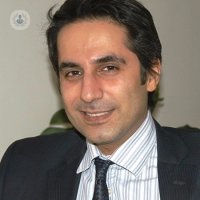Weight loss surgery: the long-term effects
Written in association with:Being unable to socialise or take part in any physical activities can leave someone feeling miserable and desperate to make a positive change with their overall health and wellbeing. Many patients have longer-term concerns about their health and the long term implications for them and their loved ones.
Who better to explain the benefits of bariatric surgery for those struggling with obesity than leading London bariatric and gastrointestinal surgeon Mr Majid Hashemi himself.

Why would someone consider bariatric surgery?
The main reason that a person would consider bariatric surgery is to improve their immediate and long term health. Bariatric surgery will also improve mobility. This, in turn, increases opportunities both socially and professionally.
There is a huge improvement in associated illnesses. If a patient is diabetic there is over a 70% chance that they can come off medication. If suffering from hypertension, the patient can reduce their high blood pressure medications. If a person has sleep apnoea, it is likely that they can come off their Continuous Positive Airway Pressure (a nasal mask worn during sleep for positive air flow) treatment.
What are the long-term effects?
Following bariatric surgery, weight loss is sustainable as opposed to cases of dieting alone, where over 90% of people regain the weight. After surgery, the weight loss is maintained. Alongside an improvement in existing illnesses, there is a lowered risk of developing new ones such as knee osteoarthritis and heart disease.
Is it true that bariatric surgery significantly changes your hunger levels and metabolism?
The gastric bypass reduces appetite in patients and they will even find that some foods no longer taste or smell the same. It may influence types of food cravings, for instance, someone may crave apples rather than chips. The sleeve gastrectomy changes hunger levels too.
How does it compare with weight loss pills?
Weight loss pills don't work and the weight that is lost is regained.
Do you think bariatric surgery should be offered to more patients?
It should definitely be offered to those with a BMI over 35 and to those who are diabetic. A person with a BMI of over 40 will develop diseases if they do not reduce their BMI. For patients in the BMI range 35 – 40, or those who have diabetes, family history of diabetes or heart disease surgery will reduce long-term risks.
It makes no sense for a high-BMI diabetic to be struggling with diabetic control and its complications while there now exists a safe, tried and tested remedy in the form of the gastric bypass.
What is LINX surgery?
I have also performed the first LINX on top of sleeve gastrectomy in the UK. It has proved to be extremely effective.
Sleeve gastrectomy is a very good operation for fast weight loss. One side effect of a sleeve, however, is bad acid reflux symptoms. Patients who have had good weight loss but might still be unhappy because they are suffering from reflux. The LINX implant is a one-hour operation that places a small magnetic ring at the top of the stomach and this stops the reflux.
If you're considering weight loss surgery, do not hesitate to book an appointment with Mr Hashemi for a first consultation.


